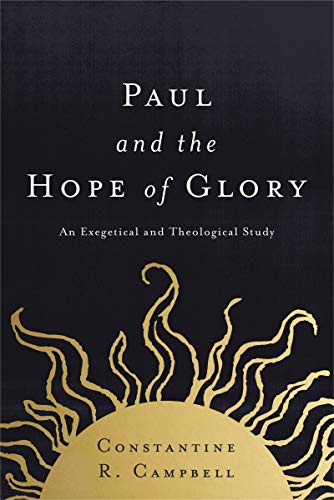A Brief Book Review from Books At a Glance
by Mark Baker
Constantine Campbell (PhD, Macquarie University) published Paul and Union with Christ in late 2012. This book pioneered a fresh method for studying themes in Paul’s letters that “bucks against current trends in New Testament scholarship” (xxi). Campbell’s method was to take an underdeveloped Pauline theme (e.g., union with Christ), exegete every major passage referring to that theme, and then provide a theological synthesis of the topic. Paul and the Hope of Glory is the second installment of what is now a series of Pauline studies that employ this methodology. As the title suggests, this work focuses on Pauline eschatology.
When you think about a theological book on eschatology, your mind might jump to the debate about the millennium. But you won’t find anything in this book on the pre-, post-, or amillennialist positions, because Paul does not mention the millennium. Campbell rather focuses on Paul’s pervasive emphasis on inaugurated eschatology, the idea that the benefits of the future kingdom have been brought into the present through the death, resurrection, and ascension of Jesus (4–5).
The book is a hybrid between a biblical commentary and a Pauline theology. Commentaries provide thorough exegesis in order to get to the meaning of a specific passage. Pauline theologies trace pertinent themes across the Pauline corpus in order to better understand Paul’s message. Campbell’s unique method provides exegesis for each passage while at the same time grouping those exegetical findings with similarly themed passages for the sake of theological synthesis. Of course, the danger of such an approach is the loss of the context of each individual passage (Campbell is aware of this potential weakness), but the benefits of new insight through a fresh methodology outweigh any potential danger.
A skeptic might wonder if Campbell is really doing anything groundbreaking here. Yes, commentaries sometimes engage in biblical theology. Likewise, Pauline theologies are built on exegesis. But this book puts it all in one place. Like an Asian restaurant where the food is both prepared and served right in front of you, this book showcases both the exegetical preparation and the theological demonstration of Pauline eschatology. It’s a 500-page feast!
The book is divided into three parts. In Part One, Campbell explains his method and provides a brief history of interpretation of the topic. It is a history of “modern” interpretation, starting with Schweitzer’s Mysticism of Paul the Apostle (1930) and culminating with Wright’s Paul and the Faithfulness of God (2013). The history is not too overwhelming for beginning students yet contains fresh analysis for the seasoned scholar.
Part Two contains Campbell’s exegesis of lexical and conceptual themes related to eschatology. He begins with a treatment of “two ages” and “two realms,” and he argues that these twin themes are the lens through which all other eschatological themes should be seen. While this organizing principle proves generally helpful, Campbell perhaps allows this lens to force a false dichotomy between a forensic structure of justification and a “realm structure,” which denies the imputation of Christ’s righteousness to the believer (67). Campbell covers eleven themes total, with the final two themes, “glory” and “hope” serving as key players in Paul’s thought. Campbell’s method for selecting themes is fair, although there are times when he makes too much of Paul’s silence. For example, he thinks that Paul could have been an annihilationist because “his writings do not strongly counter that perspective” (399). These quips aside, Campbell’s exegesis and synthesis are masterfully done and chock full of insight.
Part Three itself is worth the price of the book. Here Campbell synthesizes his findings in four chapters (with one additional concluding chapter). If you’re intimidated by this 500-page tome, just read Part 3 (a mere 138 pages). Even if you don’t agree with all of his conclusions, Campbell’s doctrinal synthesis is enlightening and will open up new vistas of exploration into the genius of Paul’s letters.
Mark Baker (PhD, Southeastern Baptist Theological Seminary) serves as professor and director of the Heart of Texas College of Ministry, located in Houston, TX.
